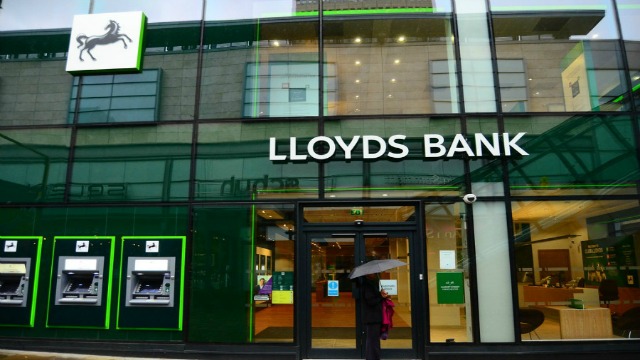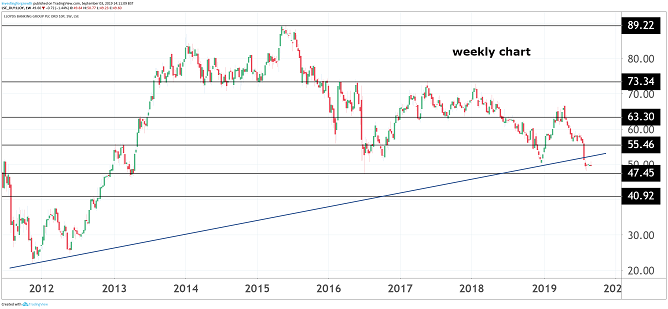What Lloyds' £3.8bn deal with Tesco means for its share price
Buying Tesco's mortgage book is smart, but this and other positives are not reflected in the valuation.
3rd September 2019 14:15
by Graeme Evans from interactive investor
Buying Tesco's mortgage book is smart, but this and other positives are not reflected in the valuation.

With all eyes on Westminster, today's impressive £3.8 billion mortgage book deal by Lloyds Banking Group (LSE:LLOY) was never going to be enough to budge a share price paralysed by Brexit.
The blue-chip stock slipped another 1.5% to below 50p, continuing the frustrations of investors who have seen the bank's progress stymied by circumstances outside management's control.
As if more evidence were needed, the well-received deal for the residential mortgage book of Tesco is another example where Lloyds has not been rewarded for doing the right things.
The bolt-on acquisition, at a 2.5% premium to face value, is expected by analysts to deliver decent returns, yet shouldn't jeopardise the expected £2 billion of share buy-backs and dividends built up via recent strong capital generation.
What matters for the Lloyds share price, however, is happening three miles from the company's Gresham Street headquarters in the City of London, as MPs at Westminster bid to stop a no-deal Brexit.
UBS analyst Jason Napier said: "Conversations with investors confirm that geopolitical risks and the rate outlook are understandably driving investor attitudes at present.
"Indeed, with all eyes on Westminster today, it seems to us that many potential investors are on the sidelines given the plausible risk of a no-deal EU exit followed by rate cuts from the Bank of England."

Source: TradingView Past performance is not a guide to future performance
The current uncertainty means Lloyds trades with a lowly 2020 price/earnings (PE) multiple of just 6.4 times, with an all-in dividend yield of 11.6%. Napier has been a long-time supporter of Lloyds and continues to see a potential share price of 70p, although this is clouded by the risk of near-term macro-economic disruption.
Napier said:
"We expect over 10% of market cap to be returned to shareholders by dividends and an ongoing share buyback in 2019 and 2020, and we think the stock is attractively valued."
Lloyds continues to trade in line with expectations, with its industry-leading cost/income ratio at under 46% particularly impressive. Other grounds for optimism include its investment in digital banking and its tie-up with Schroders, which should deliver benefits in what is the increasingly important space of financial planning.
Our own head of markets Richard Hunter thinks the "lost decade" for UK bank shares may be drawing to a close, although for now there's no hiding from the fact that they remain in the firing line. Writing in Money Observer in relation to Lloyds, he said:
"Whilst the risks to the business are well-defined, the potential is also evident."
A post-Brexit interest rate cut, however, would put significant pressure on margins at a time when the industry is already grappling with ultra competitive mortgage conditions. That's why Tesco announced in May that its banking division would cease mortgage lending.
As the biggest mortgage lender in the UK, Lloyds has the firepower to cope better than any other player. The 23,000 mortgage customers joining its Halifax subsidiary in today's deal generated customer income of £81 million and a pre-tax profit of £9 million in the year to the end of February.
Napier added: "At 1% of Lloyds' open mortgage portfolio, this is a modest transaction though one that we believe will generate decent returns."
These articles are provided for information purposes only. Occasionally, an opinion about whether to buy or sell a specific investment may be provided by third parties. The content is not intended to be a personal recommendation to buy or sell any financial instrument or product, or to adopt any investment strategy as it is not provided based on an assessment of your investing knowledge and experience, your financial situation or your investment objectives. The value of your investments, and the income derived from them, may go down as well as up. You may not get back all the money that you invest. The investments referred to in this article may not be suitable for all investors, and if in doubt, an investor should seek advice from a qualified investment adviser.
Full performance can be found on the company or index summary page on the interactive investor website. Simply click on the company's or index name highlighted in the article.